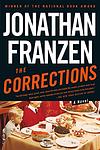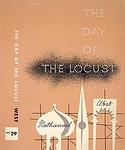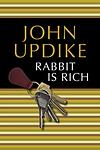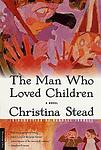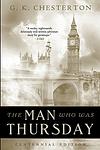The Greatest "Psychological, Satire" Books of All Time
Click to learn how this list is calculated.
This list represents a comprehensive and trusted collection of the greatest books. Developed through a specialized algorithm, it brings together 300 'best of' book lists to form a definitive guide to the world's most acclaimed books. For those interested in how these books are chosen, additional details can be found on the rankings page.
Genres
The Psychological genre of books typically explores the inner workings of the human mind and emotions, often delving into complex and sometimes disturbing psychological states. These books may focus on mental illness, trauma, relationships, or personal growth, and often challenge readers to confront their own beliefs and perceptions. Psychological books may be suspenseful, thought-provoking, and emotionally intense, offering readers a deep and often unsettling glimpse into the human psyche.
Satire is a genre of literature that uses humor, irony, and exaggeration to criticize and ridicule human vices, follies, and shortcomings. It is a form of social commentary that aims to expose the flaws and absurdities of society, politics, and culture. Satirical books often employ sarcasm, wit, and parody to challenge the status quo and provoke thought and reflection in readers. Satire can be both entertaining and thought-provoking, and it has been used throughout history as a powerful tool for social and political critique.
Countries
Date Range
Reading Statistics
Click the button below to see how many of these books you've read!
Download
If you're interested in downloading this list as a CSV file for use in a spreadsheet application, you can easily do so by clicking the button below. Please note that to ensure a manageable file size and faster download, the CSV will include details for only the first 500 books.
Download-
1. Ulysses by James Joyce
Set in Dublin, the novel follows a day in the life of Leopold Bloom, an advertising salesman, as he navigates the city. The narrative, heavily influenced by Homer's Odyssey, explores themes of identity, heroism, and the complexities of everyday life. It is renowned for its stream-of-consciousness style and complex structure, making it a challenging but rewarding read.
-
2. Lolita by Vladimir Nabokov
The novel tells the story of Humbert Humbert, a man with a disturbing obsession for young girls, or "nymphets" as he calls them. His obsession leads him to engage in a manipulative and destructive relationship with his 12-year-old stepdaughter, Lolita. The narrative is a controversial exploration of manipulation, obsession, and unreliable narration, as Humbert attempts to justify his actions and feelings throughout the story.
-
3. The Brothers Karamazov by Fyodor Dostoevsky
This classic novel explores the complex, passionate, and troubled relationship between four brothers and their father in 19th century Russia. The narrative delves into the themes of faith, doubt, morality, and redemption, as each brother grapples with personal dilemmas and family conflicts. The story culminates in a dramatic trial following a murder, which serves as a microcosm of the moral and philosophical struggles faced by each character, and by extension, humanity itself.
-
4. The Magic Mountain by Thomas Mann
In this novel, the protagonist, a young, ordinary man, visits his cousin at a tuberculosis sanatorium in the Swiss Alps. Intending to stay for only a few weeks, he ends up remaining there for seven years, becoming a patient himself. The book explores his experiences and relationships with other patients and staff, delving into philosophical discussions on life, time, and the nature of disease. It also provides a vivid portrayal of the European society and intellectual life on the eve of World War I.
-
5. A Clockwork Orange by Anthony Burgess
This novel follows the life of a violent young man named Alex, who is part of a youth subculture in a dystopian future England. Alex and his gang engage in a nightmarish spree of rape, assault, and robbery, until he is arrested and subjected to a psychological experiment by the government to "cure" him of his violent tendencies. The novel explores themes of free will, morality, and the nature of evil, while using a unique slang language invented by the author.
-
6. The Picture of Dorian Gray by Oscar Wilde
The novel follows the life of a handsome young man who, after having his portrait painted, is upset to realize that the painting will remain beautiful while he ages. After expressing a wish that the painting would age instead of him, he is shocked to find that his wish comes true. As he indulges in a life of hedonism and immoral acts, his portrait becomes increasingly grotesque, reflecting the damage his actions have on his soul. The story serves as a cautionary tale about the dangers of vanity, selfishness, and the pursuit of pleasure without regard for consequences.
-
7. One Flew Over the Cuckoo's Nest by Ken Kesey
Set in a psychiatric hospital in Oregon, the novel is narrated by a half-Native American patient known as Chief Bromden, who pretends to be deaf and mute. The story follows the arrival of a new patient, a boisterous, rebellious man who challenges the oppressive and dehumanizing system of the hospital, particularly the tyrannical Nurse Ratched. The book explores themes of individuality, rebellion, and the misuse of power, ultimately leading to a tragic conclusion.
-
8. The Metamorphosis by Franz Kafka
The book tells the story of a man who wakes up one morning to find himself transformed into a giant insect. His transformation causes him to lose his job and become ostracized from his family, who are horrified and repulsed by his new form. As he grapples with his new reality, he becomes increasingly isolated and starts to lose his sense of humanity. The book explores themes of alienation, guilt, and identity, and is a profound examination of the human condition.
-
9. Portnoy's Complaint by Philip Roth
The novel is a first-person narrative, a monologue by a young Jewish man, Alexander Portnoy, who is speaking to his psychoanalyst. He shares his struggles with his identity as a Jewish man in America, his sexual fantasies and frustrations, his complex relationship with his overbearing mother, and his experiences of guilt and shame. The book uses humor and frank language to explore themes of identity, sexuality, and the Jewish experience in America.
-
10. The Prime of Miss Jean Brodie by Muriel Spark
The novel is set in 1930s Edinburgh and follows the story of six girls under the tutelage of an unconventional teacher, Miss Jean Brodie. Miss Brodie, in her prime, takes it upon herself to educate the girls about life, love, politics, and art, often disregarding the traditional curriculum. The narrative explores the influence of Miss Brodie on the girls, the consequences of her nonconformist teachings, and the ultimate betrayal that leads to her downfall.
-
11. The Corrections by Jonathan Franzen
The novel revolves around the lives of the Lambert family, an old-fashioned midwestern couple and their three adult children. The parents, Alfred and Enid, are dealing with Alfred's Parkinson's disease and their own marital problems, while their children are each facing their own personal and professional crises. The narrative explores the themes of family dynamics, societal expectations, and the struggles of modern life. The story climaxes with the family's last Christmas together at their childhood home.
-
12. Confessions of Zeno by Italo Svevo
"Confessions of Zeno" is a satirical, semi-autobiographical novel that follows the life of Zeno Cosini, a neurotic Italian businessman, as he tries to quit smoking. The book is presented as a diary, written at the suggestion of Zeno's psychoanalyst, and it details Zeno's thoughts on his health, his family, his business ventures, and his infatuation with a beautiful woman. Throughout the story, Zeno's attempts to quit smoking serve as a metaphor for his struggles with his personal weaknesses and his quest for self-understanding.
-
13. The Adventures of Oliver Twist by Charles Dickens
This classic novel follows the life of a young orphan named Oliver Twist, who endures a miserable existence in a workhouse and then is placed with an undertaker. He escapes and travels to London where he meets the Artful Dodger, a member of a gang of juvenile pickpockets led by the elderly criminal, Fagin. Despite numerous adversities, Oliver remains pure at heart and is eventually saved from a life of crime, revealing his true identity and claiming his rightful inheritance.
-
14. Oblomov by Ivan Goncharov
The book is a satirical critique of the nobility in 19th century Russia, focusing on the titular character, a lazy and apathetic nobleman who prefers to daydream and live in his own fantasies rather than engage with the real world. His indolence is contrasted with the energetic and ambitious character of his friend who tries to get him involved in societal affairs and business. The protagonist's lethargy and inability to adapt to changing times symbolize the decay and stagnation of the Russian nobility.
-
15. White Noise by Don DeLillo
The novel is a postmodern exploration of death and consumerism in the United States. It follows a year in the life of Jack Gladney, a professor who has made his name by pioneering the field of Hitler Studies at a small liberal arts college in Middle America. Jack and his fourth wife, Babette, are afraid of death and are obsessed with finding a cure for their fear. Their lives are disrupted by an airborne toxic event, which forces them to confront their mortality and the toxic effects of modern life.
-
16. The Day of the Locust by Nathanael West
"The Day of the Locust" is a novel set in 1930s Hollywood, portraying the dark side of the American dream through the lives of its desperate characters. The protagonist, a young artist from the East Coast, finds himself disillusioned by the superficiality and decay of Hollywood society, which is filled with failed actors, charlatans, and lost souls. The narrative culminates in a violent riot, symbolizing the destructive power of frustrated dreams and the harsh reality of the American dream.
-
17. Rabbit Is Rich by John Updike
The book follows the life of a former high school basketball star, who is now in his mid-forties and has inherited a Toyota dealership from his father-in-law. He is living a comfortable life with his wife and son in Brewer, Pennsylvania during the late 1970s. The story unfolds as he navigates through his midlife crisis, dealing with his rebellious son, his longing for his old mistress, and his own insecurities and dissatisfaction. The narrative provides a deep dive into the protagonist's thoughts and feelings, offering a detailed examination of middle-class American life during this era.
-
18. Notes from the Underground by Fyodor Dostoevsky
This novel is a profound exploration of the human psyche through the eyes of a bitter and isolated retired civil servant living in St. Petersburg. The protagonist, a self-proclaimed "sick" and "spiteful" man, delves into his past experiences and personal philosophies in a series of rambling and often contradictory monologues. His existential musings touch on themes such as free will, determinism, and the nature of human action, often challenging the prevailing ideologies of his time. The narrative provides a deep and unsettling insight into the darker aspects of human consciousness.
-
19. Waiting for the Barbarians by J M Coetzee
The novel is set in a small frontier town of an unnamed empire, where the magistrate lives a life of civil service and relative peace. His world is disrupted when the Empire declares a state of emergency due to rumors of barbarian uprising. The magistrate becomes a critic of the Empire's brutal and inhumane methods of dealing with the perceived threat, which leads to his arrest and torture. As he tries to understand his role in the vast political machinery, he also grapples with questions of power, justice, and humanity.
-
20. The Man Who Loved Children by Christina Stead
This novel explores the complex dynamics of the Pollit family, focusing on the relationship between the egotistical patriarch Sam and his idealistic daughter Louie. Set in Washington D.C. during the 1930s, the story provides a stark portrayal of a dysfunctional family, where Sam's delusional optimism and insensitivity clash with Louie's growing disillusionment and rebellion. The narrative delves into themes of family conflict, emotional abuse, and the struggle for individual identity within the confines of family expectations.
-
21. The Secret Agent by Joseph Conrad
"The Secret Agent" is a dark political satire set in London in the late 19th century, revolving around a secret agent who is also a shopkeeper, his anarchist friends, and his family. The story unfolds as the agent is coerced by his foreign employers to orchestrate a bombing in a bid to provoke a political response, but the plan goes disastrously wrong, leading to tragic consequences and a deep exploration of themes such as anarchism, espionage, terrorism, and betrayal.
-
22. Ada or Ardor by Vladimir Nabokov
Set in an alternate universe where Earth is known as "Antiterra," the novel follows the lives of Ada and Van, two wealthy siblings who fall into a passionate and incestuous love affair. Their relationship evolves over a span of 70 years, as they navigate through family secrets, personal tragedies, and the complex nature of time. The book is a blend of romance, science fiction, and philosophical exploration, all told through the author's signature wordplay and intricate narrative style.
-
23. A Handful of Dust by Evelyn Waugh
Set in the 1930s, this novel explores the disintegration of the marriage of an upper-class English couple, Tony and Brenda Last. Brenda embarks on an affair with a social climber, John Beaver, leading to the demise of her marriage. After their son's tragic death, Brenda demands a divorce and a large portion of Tony's estate. Tony, heartbroken, embarks on an ill-fated expedition to the Brazilian jungle. The novel critically examines the moral decay of British aristocracy and society.
-
24. The Man Who Was Thursday by G. K. Chesterton
"The Man Who Was Thursday" is a metaphysical thriller that revolves around a poet turned detective who infiltrates a secret society of anarchists in London. Each member of the society is named after a day of the week, and the protagonist becomes 'Thursday.' As he delves deeper, he discovers that the other members are also undercover detectives, each unaware of the others' true identities. The narrative explores themes of order and chaos, faith and unbelief, with a surprising twist regarding the identity of the society's leader, 'Sunday.'
-
25. Miss Lonelyhearts by Nathanael West
This novel revolves around an advice columnist, who writes under the pseudonym "Miss Lonelyhearts", for a New York newspaper during the Great Depression. As he reads and responds to the desperate letters from the city's distressed and downtrodden, he becomes increasingly disillusioned and depressed, struggling with his own faith, identity, and the bleakness of the human condition. The protagonist's personal life also spirals out of control, entangling him in a series of complicated romantic relationships and leading to a tragic conclusion.
Reading Statistics
Click the button below to see how many of these books you've read!
Download
If you're interested in downloading this list as a CSV file for use in a spreadsheet application, you can easily do so by clicking the button below. Please note that to ensure a manageable file size and faster download, the CSV will include details for only the first 500 books.
Download









